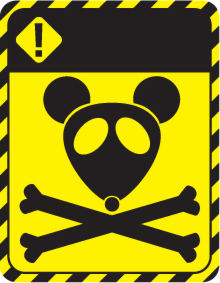There are a lot of things out pets can get into in our homes
and yard or even the outside world. Some items are benign and won’t cause any
problems while others can be life threatening. We are going to take a look at
some of the toxins out pets can encounter and what to do when exposures occur.
Rat bait is a very common toxin that pets like to ingest. It
is designed to be appetizing to animals so that the rats will in fact eat it.
There are a variety of different types of rat bait available for purchase and
in the very near future the active ingredient profile will be changing. If you
have to have rat poison down one of the best things you can do is snap a
picture of the container so that way we know what the active ingredient is and
how best to treat it.
 |
| Bruising on a dogs belly can be from a clotting disorder (Image Source) |
Some of the most common types of rat poison are those
containing baits that cause issues with coagulation or blood clotting. This
will terminate the rats by them slowly bleeding internally. The same is true
for our pets. Symptoms usually range from lethargy, bruising, blood in stool or
vomit, to coughing and inappetence. If there is rat poison in the area it is
imperative that we keep our pets away from it. They can become very creative in
how they ingest these materials.
 |
| Blood transfusions are sometimes necessary (Image Source) |
Depending on when the
exposure happened will dictate treatment. If it is recent, typically within 1
hour, we can try to induce vomiting and remove as much of the bait as possible.
Then we can give a material called activated charcoal to help bind remaining
bait in the stomach before the pet absorbs it. We will also look at blood work
to determine if the clotting factors are affected. If the clotting time is
prolonged typically we can treat with vitamin K which is a precursor for many
clotting factors and will help decrease the symptoms. There are severe
instances where blood transfusions and supportive care are necessary. While
there are treatment options pets can still succumb to this even with aggressive
treatment.
In the coming years this will not be the case and we will
see a different ingredient profile which will change the way we treat
exposures. Again, I cannot stress enough the importance of knowing the active
ingredient in the rat bait used. This will prevent any unnecessary delays in
treatment. If you see your pet ingest one of these toxins call your
veterinarian immediately. The sooner we can start a treatment protocol the
better chance we have for a positive outcome. For more information on rat
poison please view the following websites here and here.


No comments:
Post a Comment